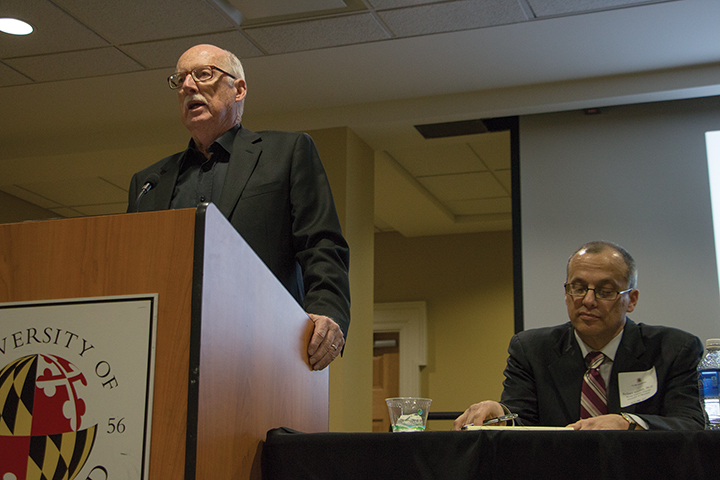
Leonard Moodispaw, KEYW Holding Corp. CEO, speaks beside undergraduate law programs director Robert Koulish at “Googling the NSA: Accountability in the Age of Big Data” last night.
Swiping a card, posting something online, driving past a traffic camera or making a phone call: these everyday activities create small pieces of data that are recorded and stored.
Actions of many U.S. citizens are retained in massive private company- or government-owned databases — what’s come to be known as big data.
The issues of big data and how those handling it can be held accountable when things go wrong was the topic of discussion at last night’s panel at Stamp Student Union, “Googling the NSA: Accountability in the Age of Big Data.”
The event, hosted by undergraduate law programs director Robert Koulish and sponsored by the behavioral and social sciences college and the Francis King Carey law school at the University of Maryland, Baltimore, featured four cybersecurity experts, with experience in government agencies, private companies and universities. The panelists spoke to a crowd of about 60 and discussed the implications of the National of the National Security Agency’s mass surveillance practices and the controversy that followed when private contractor Edward Snowden revealed them in 2013.
Knowledge and information are a form of power, panelist and law professor James Grimmelmann said. Computers available today can give anyone the ability to generate their own power, he said, simply through harnessing big data.
“In particular, this power over others includes a power to invade privacy in ways people find quite terrifying,” Grimmelmann said. “Wherever you have these kinds of concentrated data power in private or public hands, it calls for oversight and concern that we need to prevent abuses of it.”
Grimmelmann and fellow panelists KEYW Holding Corp CEO Leonard Moodispaw, law professor Michael Greenberger, university criminology and criminal justice department Chairman James P. Lynch agreed the issue isn’t that the NSA is violating laws. Rather, they said, the legal system needs to update and to hold big data collection accountable.
“While we may not like the practices,” Moodispaw said, “I can argue till the cows come home that they haven’t broken any laws.”
Greenberger said President Obama has the power to unilaterally reform NSA procedures but has been slow to act. This week, Obama proposed an end to the NSA’s mass phone data collections, to be replaced with a system of individual orders to monitor terrorism-linked numbers.
“What worries me is that [Obama] is asking that the present program be authorized. Why does it need to be authorized if it’s legal?” Greenberger said. “I worry that what we’re going to end up with is the present program clearly being legal and we’ll never get the reform.”
Lynch, who also served in the Obama administration as the Bureau of Justice Statistics director, expressed a different concern: The ability to do research, as big databases can be an important tool for academic and scientific study.
“What I’m afraid of is that the group that wants to research you, as opposed to the group that wants to identify you and rip you off, are going to be subject to the same kinds of concerns about confidentiality and other things,” Lynch said.
Panelists also weighed in on Snowden’s actions and how he was able to get so much information from the NSA.
Greenberger blamed Snowden’s company, Booz Allen Hamilton, saying it gave him top security clearance without doing a thorough investigation into his background, which would have revealed red flags from the CIA about Snowden’s having an agenda.
“His series of whistle-blowing revelations are only possible because of insufficient oversight,” Grimmelmann said, noting that Snowden was able to trick other contractors into logging in so he could gain access to a vast amount of information. “That wouldn’t happen in a world where big data users at the agency were being sufficiently surveilled themselves.”



